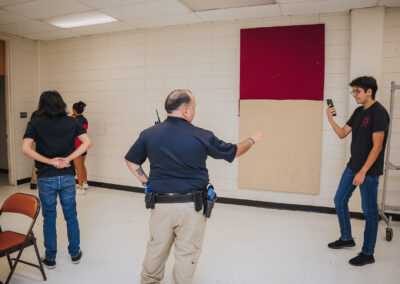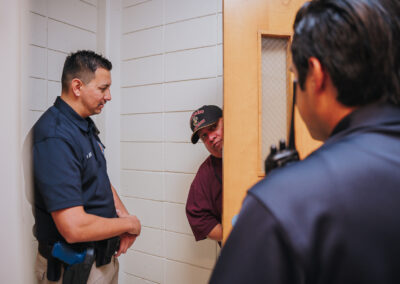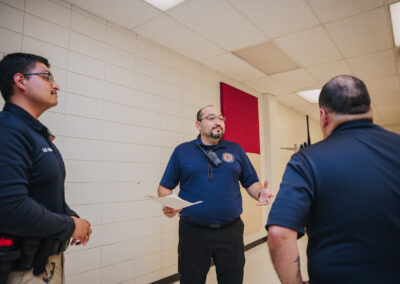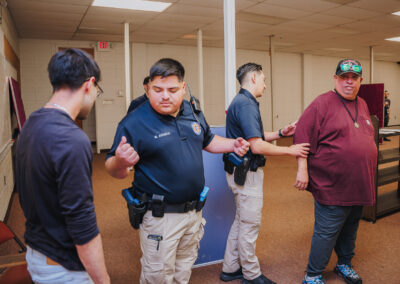In an institute of higher education, it’s not uncommon to see students engage in collaborative projects within a class to help develop teamwork.
However, at Texas Southmost College, they aren’t permanently restricted to exercising their collaborative skills within a single class, as students from an English Creative Writing course are engaging in a series of simulation scenario exercises with cadets from TSC’s Police Academy program.
TSC Criminal Justice Institute Training Coordinator Crisobel Abrego Jr. feels that this type of immersive scenario-based training is crucial to developing police officers, as it prepares them for the unexpected.
“The benefit of having roleplayers from the student community is that they’re fresh faces that the cadets are encountering for the first time, so it’s very much like what they would expect when encountering an unknown person while on duty,” said Abrego. “The students stay in character the entire time, and their scripts encourage them to throw curveballs at the cadets so that they have to dig deep into their training and get used to thinking on their feet.”
The result proved to be a uniquely engaging experience for both parties involved. In this instance, the cadets were given their first opportunity to practice skills they had learned throughout their training, such as responding to dispatchers via walkie-talkie while using proper police code and protocol.
At the same time, the creative writing students were allowed to show the depth of their creativity. For example, if a student was given a prompt to act as a domestic abuser, they were given free rein to obstruct the cadets as they attempted to gather details, employing tactics such as frequently repeating themselves and coming up with a multitude of reasons to deny the cadets entry to their classroom/residence.
“Performing something like this helps the students be more comfortable in different situations and learn to adapt to change,” said Texas Southmost College English Instructor Monica Mejia, whose students acted as counterparts to the cadets. “They gain experience acting in front of others and improvising on the spot if needed. It’s something that the Creative Writing students will need to do before the end of their semester, so getting a chance to collaborate early really helps everyone involved.”
Creative writing students were presented with scenarios police officers in the field sometimes respond to while on duty. The prompts covered topics ranging from human trafficking to domestic abuse. Students were assigned roles in each scenario and given the creative freedom to flesh out their characters’ personality traits.
Creative writing student Anthony Hudgins acted out his role in a human trafficking scenario and saw this collaborative exercise’s mutually beneficial nature.
“For us writers, it’s an opportunity to hone our improvisational and narrative skills, adapting and evolving our scenarios in real-time based on the cadets’ responses,” said Hudgins. “Cadets gain hands-on practice in a controlled simulated environment that requires them to approach situations thoughtfully rather than reactively, practicing patience, empathy, de-escalation, and keen observation.”
CJI-Creative Writing Collaborative Exercise
Creative Writing students were tasked with making the scenarios and their roles within as realistic as possible, giving the police cadets an opportunity to practice police procedure and protocol.
CJI-Creative Writing Collaborative Exercise
Cadets question a student who played the role of a homeowner. As part of the exercise, the student’s role was to attempt to obstruct the cadets procedure, while the cadets had to use their training and intuition to properly navigate their interaction.
CJI-Creative Writing Collaborative Exercise
Cadets had to respond to calls in Eidman Hall, treating classrooms as if they were home addresses and interacting with creative writing students.
CJI-Creative Writing Collaborative Exercise
Criminal Justice Institute Training Coordinator Cristobel Abrego Jr. gives constructive feedback to his cadets on how they handled responding to their scenario exercise.
CJI-Creative Writing Collaborative Exercise
On both sides of the exercises, assessment from peers and instructors was dispensed in order to enhance the collaborative experience.
CJI-Creative Writing Collaborative Exercise
TSC Police Academy cadets wrap up a collaborative scenario-based exercise with Creative Writing students. The exercises gave both groups of students the opportunity to use practical application of what they are learning in their respective classrooms in a realistic setting.












